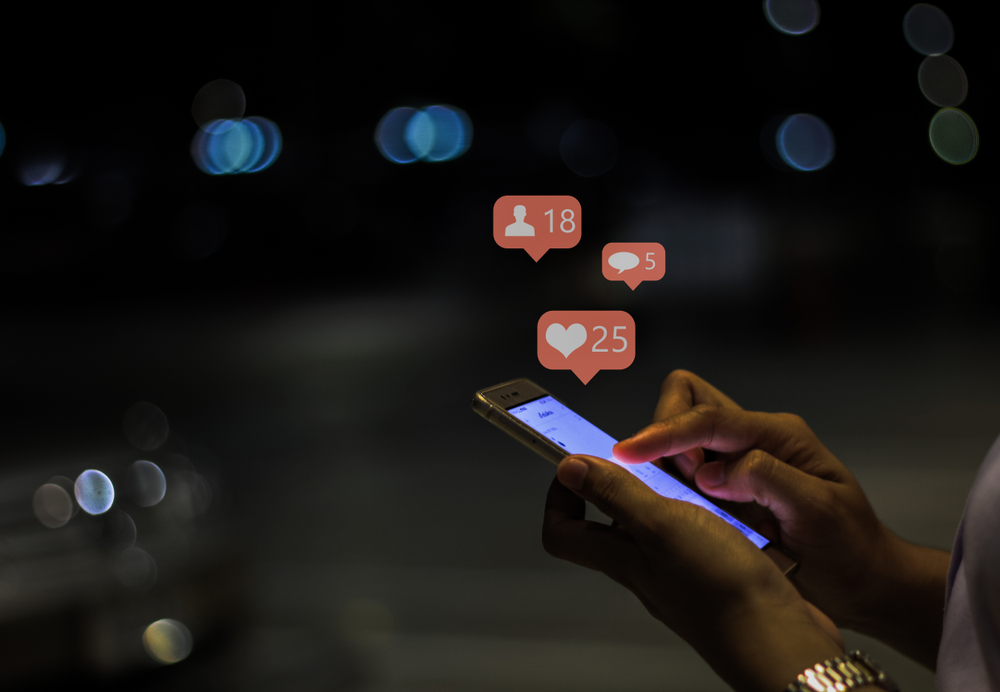
Nowadays, most of us are using at least one social media platform. And while Facebook and Instagram may seem like great ways to get in contact with friends, coworkers, and family members that you don’t see very much, a lot of them are smoke and mirrors. People are going out of their way to show the best picture of themselves on social media, even if that image isn’t exactly real.
So, while your former flame may seem smitten with their new, significant others, just know that their lovey-dovey comments on each other’s pictures and videos don’t show the whole story. Also, with filters and photoshop, you can’t compare the way you look day by day to someone’s beautifully made Instagram posts.
With so many ways to build “better” versions of ourselves online, chances are very high, even if you’ve told a fib or two on Facebook. It’s time to get serious and think about the social media lies that everyone’s been accused of saying at some point.

Lying about your accomplishments
Everyone wants someone to be proud of them. But this need for others to see your successes and achievements as something exceptional has created a culture of fabricating or exaggerating them, especially on social media.
Mike Bran, founder of Thrill Appeal, states this is something he sees all too often because people “want to be recognized.” For example, a lazy coworker who was moved to another job because they didn’t perform well in their other role could go online and say that they “got a promotion,” so that people see the switch in a positive light rather than a negative one.
Embellishing your importance at work
We all want to look like we’re the top dog in our office — so much so that a lot of people will enhance the importance of their social media role in their company. Shaun McDonough explained to Quora that he worked with people who were more than happy to receive an “inflated” job title over a pay increase, because most people would know your title, but not your salary.
Acting as if your job is more glamorous than it really is
What you’re posting on social media: photo booth shots from your company’s Christmas party, that once a celebrity came to your office, or that huge bottle of Veuve Clicquot that your boss got as a complimentary gift when she was promoted.
What you’re not showing: restocking the client mini-fridge, the air-conditioning leak that leaves a water stain on the carpet, and the co-worker who can’t get through your desk at the beginning of the week without asking if you have a “Monday Case.” Even the thing people complain about most— their jobs — is something they can’t help but glorify on social media.
Exaggerating the highlights of your travels
Of course, the pictures in front of the Eiffel Tower and the perfectly timed picture of the ocean wave are wonderful, but they don’t show the ins and outs of your journeys. They’re not showing you racing to the gate, and almost missing your flight. They’re not showing you angry and jet-lagged, unable to leave your mediocre hotel room. But when they’re on holiday, people just show the best parts of their journey.
The 2019 Jet Cost survey of more than 4,000 Americans found that two-thirds agreed “to lie about their experiences with conditions, quality of accommodation, and the amount of sightseeing they had done” while traveling, as Travel Pulse reported. So the next time you’re disappointed with a holiday, you know that most people have experienced the same thing— even if they don’t write about it.
Or just lying about the places you’ve visited
And some people are going so far as to lie about the places they’ve visited entirely. Whether it’s making up a vacation or just lying to people about having gone somewhere in the past, it’s not an unusual practice in social media. In reality, the idea exploded so much that there was a viral video trend where YouTubers would “fake” a trip to their social media accounts, showing how easy it can be.

Pretending to be in better financial standing than you are
Whether it’s a flash of dollar bills on a video screen or showing off things online that you can’t afford, people are always trying to make themselves look richer than they are. Buying designer clothes means you have money, so you post a picture of a designer bag from the store instead of actually purchasing it— but nobody has to know that, of course. Also, the trend of people posing in front of luxury vehicles that are not really theirs is an example of this. It’s all about you appearing to be wealthy.
Feigning a “healthy” lifestyle
You’re eating a salad, and you want the world to know that you’re turning a new leaf if you want to. More often than not, however, that’s not the case. Natalie Levy, founder of She’s Independent, says that this idea of wanting people to see you as “healthy” correlates with an eating disorder called orthorexia. This is where people are obsessed with eating foods that “people see as healthy,” whether or not they actually consume it in a healthy manner.
Lying about your fitness regimen
On the same note, people are also going to lie about their workout sessions. As Levy points out, many fitness enthusiasts or junkies actually have “training disorders or body disorders.” But do they show that truth online? Not quite. Instead, they “showcase the physical and speak to their success and achievements but don’t touch on much more than the physical and brands they co-promote,” Levy says. This, in turn, causes people to compare themselves unhealthily with fitness goals that may be absurd because they see it as being promoted online.
Acting as if you know about more than you actually do
It’s easy to create an online facade of knowledge. Post a photo of Tolstoy’s Anna Karenina, and people will think you’re a smart, well-read human being— even if you’ve never made it past page one. As Karl Taro Greenfield wrote for The New York Times, with the emergence of the internet, “it’s never been so easy to pretend to know so much without actually knowing anything.”
Misrepresenting the realities of parenthood
Your followers may think that your kids are “perfect little angels” if that’s all you display online about them. But the reality of parenting is far more complex than that. In reality, sociologist Koyel Bandyopadhyay wrote on Quora that parents who are obsessed with social media are actually passing unhealthful complexes on to their children.
Parenting becomes a competition, and children try to keep up with their parents’ ambitions,” she wrote. “These issues of affirmation and competition percolate to children, who feel invested in their performative capacities, aspiring to be ‘perfect kids.'”

Pretending to always be happy
In Donna Freitas’ The Happiness Effect, an overwhelming 73% of the students she surveyed said they “still seek to appear optimistic and content with something attached” to their real names. Whether you’re posting an old smiling selfie when you’re actually crying in bed or tweeting about how #fortunate you are when you’re struggling mentally and emotionally, real life doesn’t always seem to be presented on social media.
Or pretending to be in a happy, healthy relationship
Based solely on social media, the relationship of everyone is essentially a well-directed romantic comedy. And more often than not, people who turn to Facebook or Instagram to brag about their love story are probably hiding something. Spoiler Alert: their relationship is definitely not that great.
In the 2018 relationship counseling survey Relate, more than half of millennials (51 percent) claimed to have made their relationship look much happier online than it really was, and 42 percent worked to carefully design a “perfect relationship” online. In fact, however, all these couples have differences behind the screen.
Lying about your single status
Dating expert Laurel House, on the other hand, says that some partners will go the opposite route and not post on social media about their significant other. Many people are creating a fake person online as if they’re living a single life when they actually have someone at home. They keep their relationship secret so that they can flirt with others or even cheat without anyone knowing the truth.
Acting as if you’re over an ex
Who among us didn’t get out of a relationship and then posted a picture where we look happier than ever to prove to the world— but most of all our ex— that we’re thriving? In reality, there are online articles dedicated to coaching people on how to behave on social media after a split. But just because we don’t all wear our heartbreak on our social media sleeve, that doesn’t mean we don’t experience it.
Faking flawless skin
It’s easy to compare your raw, acne-scarred, sensitive skin to someone else’s complexion in an Instagram post, but you’re just holding yourself up against a false image. As Stacy Caprio, the founder of the AcneScar blog reminds us, the truth is that no one has “perfect skin.” Pictures that you’re comparing your skin to have filters on them and they may have been “smoothed” by tools like Facetune or Photoshop.

Posting “no makeup” selfies that stretch the truth
Who’s going to say that the #nomakeup selfies are actually makeup-free? It’s easy to hide a little concealer here or some mascara there. And even if you’re completely bare-faced, you can use angles, filters, and smoothing tools to help with the so-called “natural” facade.
Additionally, you shouldn’t compare your natural skin to the makeup-free images of celebrities. “Their selfies—although gorgeous and empowering—offer potentially harmful examples as to what natural beauty should look like,” Brianna Arps wrote for Insider. “Among the things not discussed, perhaps, are the faux eyelash extensions, lip fillers, doctored eyebrows, and expensive spa treatments that many celebrities pay for that the average person simply cannot afford.”
Or solely showing the glamorous side of self-care
On social media, someone might post a photo of themselves wearing a face mask and a pedicure with the hashtag #treatyourself. But the reality is that self-care is not always a glamourous, classy thing. Often your laundry is finally done after you let it pile up for weeks or take a shower after you waste days lying in bed exhausted.
As Mawiyah Patten wrote for The Mighty, what people don’t often tell you is that self-care includes “activities you want to put off indefinitely.” “Self-care sometimes means making tough decisions which you fear others will judge,” Patten continued. “Self-care involves asking for help; it involves vulnerability; it involves being painfully honest with yourself and your loved ones about what you need.”
Pretending you’re neater than you are
We all had the moment we went to take a picture, put our phone down, and quickly scrambled to straighten out the landscape behind our photo subject. After all, our Instagram followers don’t know how messy we are! But just because no one’s clutter is finding its way to their social media feed, that doesn’t mean it doesn’t exist.
Deleting the past
With a simple “delete” button, it’s simple to make it appear as if things about your past have never happened before. Did you have a musician that you liked when you were a teenager that you continuously posted about? If you don’t want anybody to know about your former guilty pleasure, you can just delete those posts.
Overinflating your health situation
Sickness is never pleasant, but an average cold is rarely life-threatening. That said, there are a lot of people who prefer to make it look like their prognosis is serious. It’s the online version of wanting your mom to take care of you when you’re sick, except this time, it’s all about Facebook. If someone is seriously ill, one of the last things on their mind is to take an E.R selfie or a picture of their medical band.

Pretending to be friends with everyone and anyone
Everyone is trying to appear more “social” on social media than they actually are. People want it to seem like they have a lot of friends who always want to hang out with them. And sure, it might have been awesome to be invited to the VIP section or to meet that A-lister, but if you’re trying to draw attention to your online relationships, odds are they’re not as strong as you’re making them out to be.
Lying about the circumstances of an event
Likewise, if an event or circumstance is not exactly the story someone intends their followers to know, they can take part in it and control the narrative through social media. Psychologist and social media strategist Louise Sattler tells she frequently sees this with the people she works with.
For example, attending the same party as a famous person or someone with a high profile is not the same as knowing them or “working” with them and their affiliates. But people are going to spread the reality of their experiences to make themselves look “cooler” online.
Not showing the reality of your “fun” night out
Those images of you dancing with an extra-large margarita in your hand might make it look like every night of your life is a party. What most people knowingly leave out, however, is the awkward stumble at home, the one-person Gatorade-chugging contest that you had when you got there, and the pounding headache that you’re still dealing with a day later.
Pretending people are more interested in your life than they are
Any social media post that starts, “I know you’ve all been wondering…” is probably the beginning of a lie. In fact, it’s a normal practice for certain people to set up such carefully crafted falsehoods with a little “vaguebooking” in advance, to drop the well-placed “They know what they did” or “Big News Today! Can’t talk about it just yet.”
Presenting other people’s content as your own
In a world where it is crucial to be genuine— but not necessarily authentic— the pressure for original content is greater than ever. But even if someone brags that their content is original, this might not be. There are a lot of people online who take the work of other individuals and try to pass it on as their own.

Pretending to be environmentally conscious
People tend to jump on trends quickly, even if they don’t actually implement them in their own lives. That’s exactly what happened to the eco-friendly movement. People would tweet #savetheturtles, but they would buy five plastic bottles of water from the supermarket the same week.
In a 2016 Trulia survey of more than 2,000 Americans, 79 percent of the respondents said they found themselves to be environmentally conscious. However, only 26% said they were actually doing anything beyond recycling and turning off the lights every so often.
Overinflating your charitable nature
Many people inflate their good actions and good intentions online when they don’t really go out of their way to volunteer or contribute to charity. In addition, the U.S. Bureau of Labor Statistics estimated that only about 25 percent of Americans actively volunteered at least once from September 2014 to September 2015.
Not a very promising statistic, especially for the number of people who brag about their kindness and social awareness online.
Exaggerating your level of political activity
It’s easy to share numerous political posts on Facebook without actually spending some time involved in any political activity. People on social media love to falsely claim that they are on the pulse of politics, dedicating hours to canvassing and calling voters. But considering that the Bipartisan Policy Center has revealed that just over 50 percent of registered voters actually made it to the polls in 2012, the chances of that happening are that the “I voted” sticker marks the extent of your political activity.
Lying about your age
As people age, they tend to want to keep on to their youth, even if they have to lie to do so. But they’re not the only ones who may be lying online about their age. You must be 13 years of age or older to have a Facebook page. However, in the 2013 Advertising Standards Authority survey, The Guardian reported that 83% of children between the ages of 11 and 15 had registered on social media platforms using a false age.
Acting as if you don’t care
While you may not let anything other people think get to you, those posts that proclaim that you can’t care less about other people’s opinions are woefully transparent. The whole purpose of social media is to post things for a reaction — if you really didn’t care about it, you would log in for good and become a social media naysayer.












































